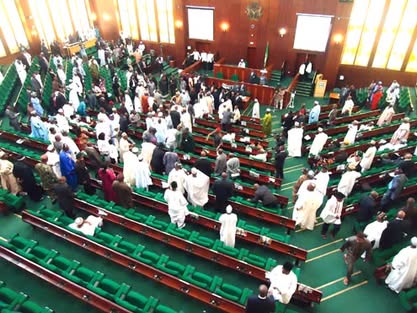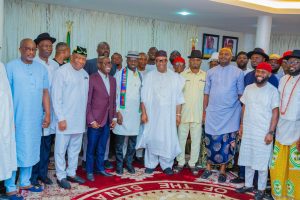House of Representatives Members in Heated Shouting Match Over State of Emergency in Rivers State (Video)
The House of Representatives in Nigeria has witnessed a particularly intense and dramatic confrontation as members engaged in a heated debate over President Bola Ahmed Tinubu’s declaration of a State of Emergency in Rivers State. The conflict escalated quickly during the plenary session, with emotions running high as lawmakers from various political parties clashed over the constitutionality and implications of the President’s decision.
The source of the dispute was the decision by President Tinubu to declare a State of Emergency in Rivers State, which has been facing significant challenges related to security, governance, and the rule of law. The declaration, which is a rare and powerful measure in Nigerian politics, has sparked serious debates among politicians, particularly those representing the state or allied to its interests.
The declaration of a State of Emergency typically grants the federal government increased powers, including control over certain aspects of local governance and security enforcement. While proponents argue that it is a necessary step to restore order in troubled regions, critics view it as an overreach that undermines the autonomy of state governments and weakens the democratic process.
The atmosphere inside the House of Representatives was charged with tension even before the commencement of the plenary. As soon as the issue of the State of Emergency was raised, the floor quickly became a battleground for verbal attacks.
Two members of the House, both of the People’s Democratic Party (PDP), played central roles in the dispute: Marie Ebikake, representing Bayelsa State, and Blessing Amadi, representing Rivers State. Both lawmakers, visibly passionate about the issue, squared off in a shouting match as they debated whether the President’s declaration was constitutional or politically motivated.
Ebikake and Amadi’s exchange was marked by high-pitched voices and pointed accusations, with Ebikake questioning the legality of the President’s actions and Amadi defending the move as necessary for the preservation of law and order. Their confrontation quickly became a symbol of the broader divide in the House, with members taking sides and raising their voices to add their perspectives.
As the argument between Ebikake and Amadi intensified, several other lawmakers joined in, making it clear that the debate was not just limited to a couple of individuals but represented a broader concern within the legislative body. Some lawmakers were seen banging their tables in protest, expressing their disapproval of the situation, while others were heard shouting in support of one side or the other.
In the midst of the shouting, some members appeared ready to physically engage with one another, as the passionate rhetoric and personal attacks seemed to reach a boiling point. The tension in the room was palpable, with certain lawmakers calling for order while others insisted that their concerns about the State of Emergency needed to be heard and addressed immediately.
Despite the chaos, the Speaker of the House, Femi Gbajabiamila, attempted to maintain control over the proceedings. However, the disruption seemed to only escalate as the debate moved forward, with both sides firm in their beliefs about the President’s decision.
The core of the debate revolved around the legality and political implications of the President’s declaration. Lawmakers like Ebikake argued that the State of Emergency was an unconstitutional act that violated the spirit of federalism and undermined the powers of state governments. They expressed concern that such a decision could set a dangerous precedent for the future, leading to the erosion of the autonomy of state governments across the country.
On the other side, lawmakers like Amadi defended the declaration, emphasizing the severity of the security situation in Rivers State and the need for federal intervention. They argued that the state government had failed to address the issues of insecurity and that a State of Emergency was the only viable option left to restore order and ensure the safety of citizens.
The debate also touched on the broader political implications of the move. Opponents of the declaration viewed it as politically motivated, arguing that it was a way for the federal government to assert control over a state that had been governed by the opposition party, the PDP, for years. Supporters, however, contended that the move was purely a matter of national security and not related to political maneuvering.
The shouting match and the broader debate have led to a range of reactions both inside and outside the House. Some members of the opposition party, the PDP, have expressed their outrage over what they see as an abuse of power by the federal government, while others have praised the decision, viewing it as a necessary step to tackle the growing security crisis in the region.
In Rivers State, local politicians and activists have also weighed in on the issue, with some supporting the declaration as a way to combat the increasing violence and criminal activities in the state, while others have condemned it as an infringement on the state’s autonomy and a sign of the federal government’s overreach.
The political tension surrounding the declaration of a State of Emergency in Rivers State is unlikely to dissipate soon, as the issue has become a flashpoint for broader debates about governance, security, and federalism in Nigeria.
The shouting match in the House of Representatives over President Tinubu’s State of Emergency declaration in Rivers State underscores the deep divisions within the Nigerian political landscape. The intense debate reflects not only the personal stakes of the lawmakers involved but also the larger issues at play, including the balance of power between the federal and state governments, the role of the military in governance, and the ongoing security challenges facing the country.
While the House may eventually reach a decision on the matter, the passionate exchange of words is a stark reminder of the difficulties in navigating Nigeria’s complex political and security environment. The resolution of this debate will likely have lasting implications for the future of governance in Rivers State and, potentially, other regions facing similar challenges.






Ndigbo should be very careful about what is happening in Rivers. This was the same way it started in Western Region then but ended up in excruciating genocide in the East. Once bitten,they say,twice shy. The East again could be their target,to complete the extermination that was started way back in 1967.. Our sympathy shld go to the people of Rivers who seem to be sacrificed,but then we must watch our back bcos from the look of things the war has not ended yet